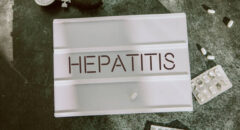
Though the Centers for Disease Control and Prevention (CDC) recommends that everyone does regular screenings for hepatitis C, statistics show that many people don’t get tested. There are, however, several reasons for you to talk to your doctor about getting tested for Hepatitis C.
10 Reasons To Get Tested
1. A Regular Blood Test Yielded Strange Results
Technically, doctors may call this a deranged blood test result. This categorization simply means that a blood test that was conducted during a regular check-up suggests something else is wrong. That isn’t a definitive diagnosis of hepatitis C, so your doctor will likely suggest further testing.
RELATED: Tattoo Safety 101: Choosing a Hep C Free Studio
2. You Got A Recent Piercing Or Tattoo
It doesn’t happen often but tattoo and piercing equipment can be infected with the hepatitis virus because they pierce the skin. While you should always ask how tattoo artists and piercers clean their equipment, it’s a good idea to get tested as well.
3. Your Job Puts You At Risk
If you’re a medical professional or a caregiver for someone who has Hepatitis C, you have an increased risk of being exposed to the virus. Though you should take all the necessary precautions to protect yourself from bloodborne diseases, getting tested regularly is important.
4. You Have Had An STI
Studies show that persons who have contracted sexually transmitted infections (STIs) are more likely to get hepatitis C as well. If you’ve been treated for an STI, then getting tested is a good idea.
5. You Had A Blood Transfusion Recently
Blood used for transfusions is indeed tested thoroughly before being used. However, there is the rare occasion where the tests don’t detect the virus.
6. You’ve Shared Personal Items With Infected Persons
If you’re sharing your living accommodations with friends or loved ones who are infected with hepatitis C, you may have been exposed.
RELATED: After Hep C Diagnosis: What to Ask Your Doctor
7. You Have A History Of Using Injectable Drugs
This is the most common way for persons to contract the disease. In fact, almost 80 percent of new drug users get hepatitis C within a year of using. Even if you no longer do it, the virus could still be lurking in your system.
8. You Do Dialysis
Dialysis equipment is typically cleaned thoroughly. However, running your blood through a machine can introduce certain infections. It’s not uncommon for nephrologists to request specific blood tests regularly. Hepatitis C is one of them.
9. You Had An Organ Transplant Before 1992
Before 1992, transplant organs and the blood being used during surgeries or transfusions weren’t tested for hepatitis C. This makes it more likely for those who got transplants or transfusions before that time to have the virus.
10. You’ve Been Incarcerated
Being in close quarters in prison can increase your risk of exposure to bloodborne illnesses. If you opt for a prison tattoo or piercing, that ups your chances as well because the equipment that will be used is unlikely to be thoroughly cleaned.
RELATED: The 8 Worst States for Hepatitis C
What The Tests Are
Hepatitis C can be diagnosed through two different types of blood tests. These are the anti-HCV and Hepatitis C RNA tests. When you get infected with hepatitis C, your body produces anti-HCV antibodies that never leave your body. The anti-HCV test is designed to detect these antibodies. The only drawback of this test is that it can’t differentiate between an infection that has been treated and a new one. The RNA test, on the other hand, can determine the viral load in your blood. This information can tell your doctor if it’s a current infection and how far the illness has progressed. This is why an RNA test is usually recommended after the anti-HCV.
RELATED: What Hepatitis Can You Get From Food?
How To Interpret The Results
The results of an anti-HCV test can either be reactive or non-reactive. A non-reactive test is interpreted as negative. It means that you don’t currently have hepatitis C and have never had it. A reactive test means that you either have a current infection or had the illness in the past. A reactive anti-HCV test will typically trigger your doctor to order a hepatitis C RNA test.
Since hepatitis C can be asymptomatic during the early stages of infection, it makes sense to get tested regularly. If you might have been exposed or just want to be safe, it’s best to know for sure.








